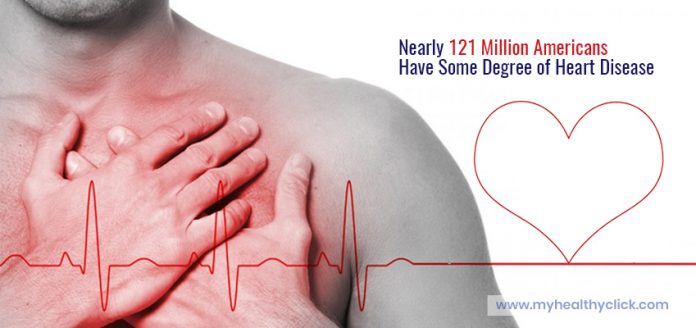According to a new report, nearly 121 million Americans have some degree of heart or blood vessels disease, which has significantly increased over the last three years.
The alarming numbers released on Thursday by the American Heart Association are chiefly due to changes in the blood pressure guidelines. Experts say there is a strong public health message, warning about our unhealthy lifestyle.
In 2017, the American Heart Association redefined one of the major risk factors for heart disease called hypertension as a blood pressure of 130/80, lowering it from 140/90. The change meant that millions of Americans aging 20 and 60 or above were considered to have some degree of cardiovascular disease.
Dr. Ivor J. Benjamin, volunteer president of the American Heart Association and director of the Cardiovascular Center at the Medical College of Wisconsin in Milwaukee, said, “As one of the most common and dangerous risk factors for heart disease and stroke, this overwhelming presence of high blood pressure can’t be dismissed from the equation in our fight against cardiovascular disease.”
Hypertension diagnosed before 40 is linked to earlier heart disease and strokes.
In the U.S., cardiovascular disease is the No. 1 cause of death, causing over 840,000 deaths per year. After years of steady decline, the number of deaths caused by cardiovascular disease rose by roughly 4,000 cases between 2015 and 2016.
Dr. Jennifer Haythe, co-director of the Women’s Center for Cardiovascular Health at the New York-Presbyterian/Columbia University Medical Center, said, “It is a startling number but not an overwhelmingly surprising one given the increased prevalence of obesity, diabetes, and sedentary lifestyle.” “The hope is that the numbers startle people into changing their lifestyles and that people go to the doctor to have some of their cardiovascular risk factors assessed.”
Cardiovascular disease is preventable. Nearly 80 percent of all heart and blood vessels can be prevented simply by following a healthy lifestyle. One should quit smoking, exercise regularly and eat healthily. More importantly, one should manage their hypertension, diabetes and high cholesterol in order to prevent cardiac complications.
Hypertension raises the risk of strokes, heart attacks, and other problems. Unfortunately, approximately half of the people with high blood pressure have it under control, says research.
Dr. Steven Nissen, one of the renowned cardiologists at the Cleveland Clinic, says, “The findings don’t necessarily mean heart disease in the U.S. is worsening. Overall, deaths attributed to heart disease have fallen by 17.7 percent over the last several decades, largely due to declining smoking rates.”
The cardiologist also said, “What has happened is that the 120 million Americans cited here reflect a growing number of patients with hypertension based on a change in the blood pressure guidelines,” “Despite the study’s claims, we have made substantial progress in the field, and coronary artery disease has decreased significantly in the past several decades.”
A diagnosis of hypertension does not mean that an antihypertensive agent is required right away or that the person essentially has Coronary Artery Disease (CAD). CAD is a type of cardiovascular disease in which the blood vessels in the heart get hardened and constricted.
Dr. Leslie Cho, cardiologist and director of the Cleveland Clinic’s Women’s Cardiovascular Center, said, “A blood pressure of 130/80 is an important reminder to employ lifestyle modifications. These are risk factors we can completely control, like diabetes, smoking and diet.”
She added, “If you lower your body weight you can decrease your blood pressure by about 8 (blood pressure points), and we’re not talking about hundreds of pounds here. We’re talking about as little as 5 percent of your body weight.”
Lowering the risk of heart disease
Following the DASH diet that includes a meal plan of vegetables, fruits, and whole grains and exercising regularly have found to improve heart health.
Dr. Elizabeth Jackson, professor in cardiovascular disease at the University of Alabama at Birmingham, explained that not every patient has the same optimal targets; however, it is important to know the numbers of blood pressure, blood sugar, and cholesterol. She added, “Forty-eight percent of people won’t drop dead of a heart attack,” “But the report does show that there is an increase in the prevalence of coronary heart disease risk and highlights the importance of managing those risks factors with lifestyle changes and appropriate treatment.”























